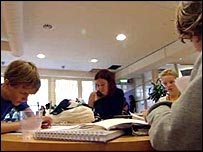|
By Mike Baker
BBC education correspondent
|


Paula (l) was unhappy at her local state school
|
The Conservatives have promised to give parents greater choice of schools. Their "pupil passport" idea is similar to a scheme in Sweden, as BBC education correspondent Mike Baker reports. Inger Svendsen is delighted with Sweden's school choice system. Her 14-year-old daughter, Paula, was unhappy at her local state school in Stockholm.
A bright and independent-minded girl, Paula felt stifled by its formal teaching style.
Fortunately for Inger, under Sweden's school choice arrangements she was able to choose any other state school or a private school at no cost to herself.
Paula now goes to the Kista Kunskappskolan, an independent school run by a commercial company. All the fees are paid by the state.

Pupils in these private schools are encouraged to organise their own learning
|
According to Inger, it is very important for parents to make choices. Now she has changed schools, Inger says Paula is "much happier and studies better". Sweden's school choice system was introduced in 1992. It is based on a virtual "voucher" which is equivalent in value to the average cost of educating a child in the local state school.
Parents can use this "voucher" to "buy" a place at the school of their choice. The idea is that funding follows the pupil and, in this way, the state supports the schools that are most popular with parents.
Like the Conservatives' proposals in England, the Swedish voucher cannot be "topped up". In other words, any private school participating in the scheme cannot charge any additional fees.

Teaching styles are informal
|
Nor can the private schools select pupils on any basis other than first-come-first-served. Before vouchers there were virtually no private schools in Sweden. Now there are almost 800. They educate around 6% of all pupils.
The school chosen by Inger is a product of the voucher scheme. It is run by the Kunskapsskolan company which was set up by a venture capitalist and entrepreneur to take advantage of this new source of state funding for private schools.
In its fifth year, Kunskapsskolan runs 22 schools and is now making a profit.
Individualised model
The Kista Kunskapsskolan, in a suburb of Stockholm, has 332 students aged from 12 to 15. It is deliberately different from the state school model.
Kunskapsskolan's ethos is perhaps surprising to British visitors who expect independent schools to be more traditional than their state equivalent.
The Kunskapsskolan at Kista is the opposite: no uniform, very informal discipline and teaching, an open-plan layout, and an emphasis on individualised learning rather than formal classes.

Anders Hultin: "There are winners and losers"
|
The students negotiate their own timetable each week and can do as few, or as many, formal classes as they wish. There is heavy emphasis on internet-based learning and there are remarkably few books. According to Anders Hultin, chief executive of Kunskapsskolan, the whole idea is to be different from state schools so parents have a choice.
Moreover, he says the company is motivated to satisfy parental wishes because that is how it makes its profits.
"It is hard to see any conflict between the company and our parents as our profit comes from good results and satisfying parents and students. If we don't perform well, then we don't make any profit at all", he says.
Mr Hultin is unapologetic about any problems the school choice system may have caused to state schools.
In some urban neighbourhoods, 10-20% of students now use the voucher scheme to attend private schools - leaving empty spaces at state schools.
"Of course there are losers", says Mr Hultin, "because schools which do not attract parents lose out and they should be losers."
Union co-operation
Any scheme like this in Britain would attract fierce opposition from the teacher unions. Not so in Sweden.
The Swedish Teachers Union, Lärarförbundet, supports the school choice policy.
According to its president, Eva-lis Preisz, members were "a little suspicious at first" but are now satisfied by the restrictions which prevent private schools from charging top-up fees or selecting students.
However she does point to reports from the Swedish National Agency for Education which warn that it is mostly better-educated, middle-class parents who take advantage of the right to choose schools.
This can mean children from middle-class backgrounds congregating in the same few, highly popular, schools.
For now, though, the union is happy to co-operate with the scheme subject to continuing safeguards.
"Now there are guarantees that private schools must use trained teachers, be open to all, and not charge fees, we are content, but we must keep an eye open for the dangers of segregation," Eve-lis Preisz says.
Could it work here?
Sweden does appear to have found a typically Scandinavian "third way" approach to school choice. It is a system which is unafraid to use the private sector to deliver state services but with strong guarantees of equality of access.

Is the Swedish system viable here?
|
Moreover, although the school choice policy was introduced by a right-wing government, it is now part of the political consensus and it is unimaginable that any new government would reverse it. But could such a scheme work in Britain? The Conservatives believe it would both attract new suppliers of school places and would be popular with parents.
But there is one big difference between the Swedish and the English school systems. Whereas Sweden had virtually no pre-existing private sector, independent schools are long-established in England.
Would leading English independent schools be willing to provide places at the same cost as state schools when their own fees are currently two to three times this level?
And, just as tricky, would they be ready to give up their right to select pupils by entrance test or interview?
